Today on Tripawd Talk Radio, we discuss Fear Free Pet Cancer Care for Tripawds (and their four-legged friends!). Our guide is Dr. Vanessa Rizzo, an oncologist from Washington state and passionate advocate for Fear Free® vet visits for all pets.
Fear Free® Pet Cancer Care for Tripawds is Here!
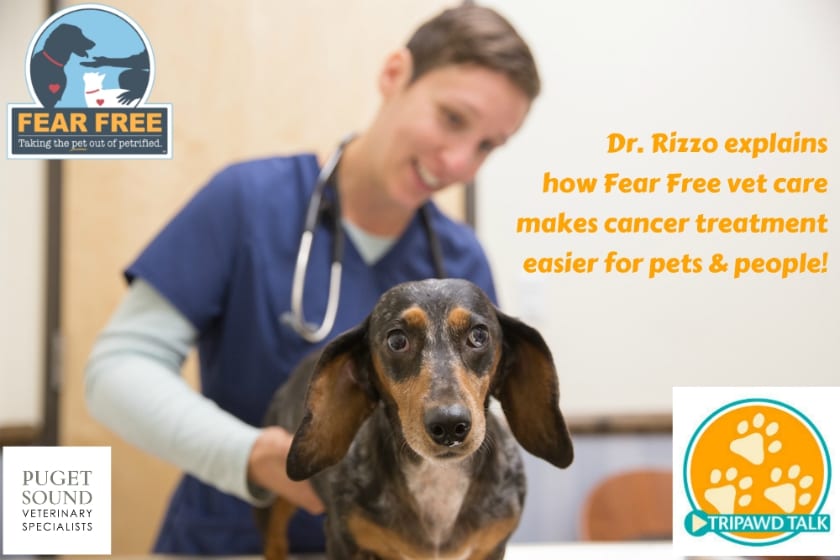
What is the most important factor when considering chemotherapy for your dog or cat with cancer? And why is it also important to think about nutrition, the clinical experience, and our emotions? Today you’ll find out, on this episode of Tripawd Talk Radio with Board Certified Veterinary Medical Oncologist, Dr. Vanessa Rizzo.
If you joined us because of cancer, you know that it’s an overwhelming situation. When our pet has cancer, we feel scared, and unsure about whether or not to proceed with treatment. Maybe your pet hates going to the vet, and chemotherapy doesn’t seem like an option. Before you decide, you’ll want to check out our chat with Dr. Rizzo. Today, thanks to certified Fear Free veterinarians like her, treating cancer in Tripawds (and all pets) isn’t as bad as we imagine it to be.
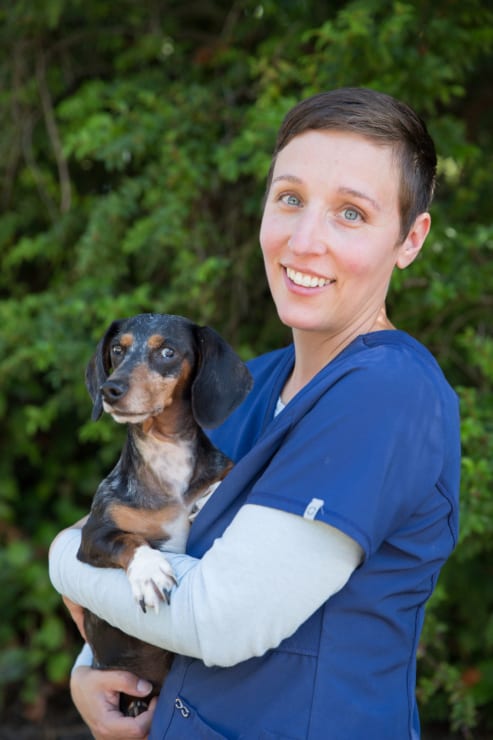
Dr. Rizzo is what’s known as a “Fear Free®” veterinarian. She and her clinic team is trained in making any trip to the vet a fear-free experience for our pets, ourselves, and everyone involved. As Medical Director and Chief Oncologist at Puget Sound Veterinary Specialists, Dr. Rizzo will explain:
- how the Fear Free experience makes vet visits easier for our pets
- the number one most important thing to know when considering chemotherapy
- how to see the big picture when considering cancer treatments — one that includes oncology, nutrition, the clinical experience, our emotions, and living in the now.
Please note: this episode was recorded before the Coronavirus pandemic became official. However the Fear Free principles Dr. Rizzo practices remain the same. She is still seeing patients at her clinic, and consulting with pet parents via curbside and telemedicine. Also, in our interview we mistakenly said that Dr. Rizzo’s clinic is Fear Free Certified®. Off-air, she later corrected our mistake; her staff is certified, the clinic itself is not–yet. The transcription reflects our correction but the podcast itself does not. Thanks for your understanding.
No time to listen to the podcast? Read the transcript below!
Fear Free Cancer Care for Tripawds
Transcript
TRIPAWDS: Tell us just a little bit about yourself and why you decided to open your practice.
DR. RIZZO: Well, I am originally from the East Coast but I fell in love with the Pacific Northwest. I decided to start this practice mainly for honestly, for veterinary healthcare workers. I’ve worked in quite a few practices where I don’t think that their needs were being addressed. They work really hard at what they do. They care a lot about what they do. They care mentally for the patients and the clients. And I’ve worked in several practices where they were treated like commodities I guess or replaceable.
And so, I did my best within that environment to show them how much I appreciated all the work that they did for me. I get compliments a lot from clients but really, I can’t do anything without my team. And it finally got to the point where I decided that the only way to truly be a voice for them and to create a better working environment was to be in charge.
TRIPAWDS: That’s awesome. I noticed that you had a lot to say about that in your about section of your website and it was so refreshing.
DR. RIZZO: Yeah, I feel very strongly about it.
Meet Dr. Rizzo’s Fear Free® Cancer Care Vet Team
TRIPAWDS: Can you share a little bit about the fear-free vet care experience and why you decided to do it?
DR. RIZZO: Yeah, absolutely. When I found out about fear-free, I was like, “Wow! Where has this been for the past 10 years of my career and before that?” And when I started taking classes, luckily I found out that my technician had already taught me quite a few of those techniques so I was glad about that but I also learned some new stuff on how to reduce fear, anxiety, and stress in our patients and for our patients and oncology, I mean they would come back over and over again.
We are trying to make it pleasurable for them. We want them to like coming to the clinic. And luckily, we are able to achieve that. For some dogs, that’s really easy. You just have to bribe them and play with them and sort of make a fuss over them and that’s easy. For other dogs, they are a little bit more cautious. And certainly, it’s not easy to win the love of a cat who just met you for the first time.
We are really trying to minimize their stress, the client’s stress. And I also, I find that it helps us. It helps the veterinary healthcare worker. We don’t want to hurt anybody. We don’t want to be causing fear or stress for our patients. We want to be doing good things for them. And I just think that it helps everybody involved.
TRIPAWDS: Oh, I totally believe that. I mean I have one of those dogs who hates going to the vet and doesn’t matter what you throw at him, I mean he is a stress case when he goes. And one of the caveats, when people in the Tripawds community are wondering, “Should I do chemo? Shouldn’t I do chemo?” one of the things we’ve always said is if your dog doesn’t like going to the vet, you might want to consider that. It’s not going to be the best situation for them because you have to go back so many times.
DR. RIZZO: Absolutely.
TRIPAWDS: Yeah. And now that there’s a fear-free clinic team like yours out there, I hope more and more will do it because we will start telling people, “Hey, if you can work with a fear-free practice, you’re going to see a difference.” And we have had members comment when they switched to a fear-free general practice that they noticed a difference right away.
DR. RIZZO: Oh, that’s great. And if they see their pet being stressed out or pulling in the other direction when they got to the door, that only causes more anxiety in the families. But when I hear stories about the dogs puffing off in the backseat when they round the corner to the clinic and they are pulling the owner into the clinic, I mean that’s awesome.
What is a Fear Free Vet Visit Like?
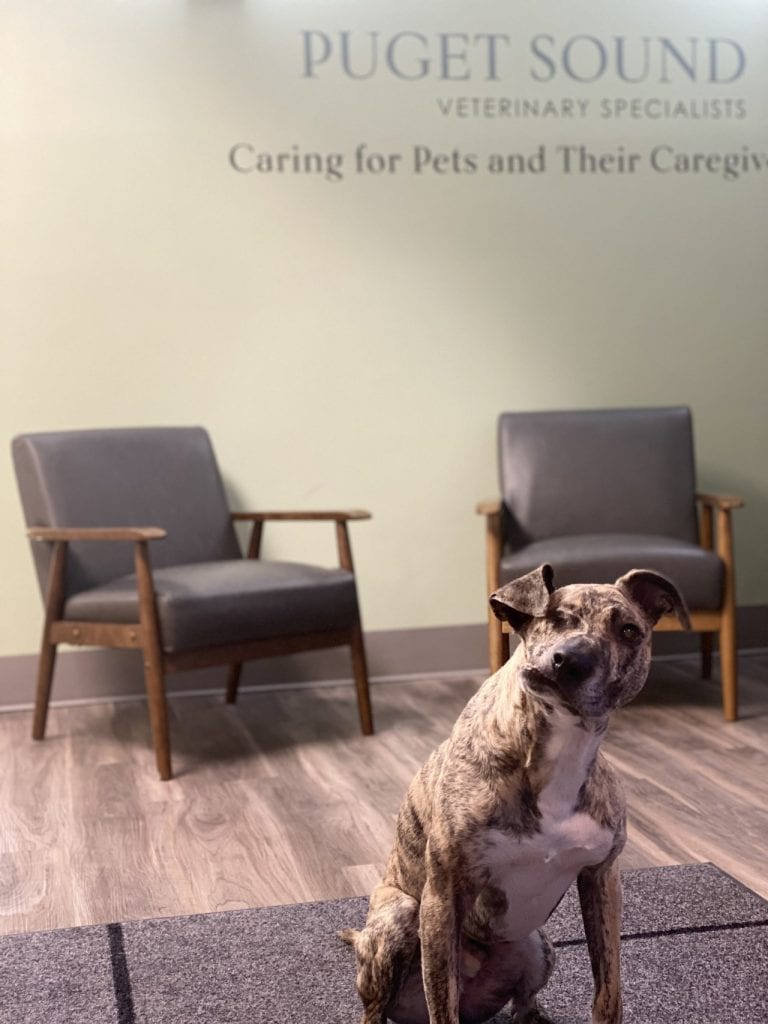
TRIPAWDS: What are a couple of techniques you use to get the dogs excited and then maybe to keep calm when the oncology session is going on?
DR. RIZZO: Yes. So we immediately start giving them treats so the dogs who will take treats, it makes our job a lot easier. We speak softly from beginning to end. We use a technique I learned from going through these fear-free courses is the music. The music is supposed to keep them calm. So we have that playing in the lobby, in the exam room and also in the treatment area.
- I immediately give treats as soon as I walk into the room.
- I don’t make a huge fuss as soon as I walk into the room but I just start giving treats.
- I talk to the owner and then I sit calmly on the floor and I don’t do an exam right away.
- I just sort of scratch and pet and talk with the family and then I try to get an exam in sort of while I’m scratching and petting.
- Once I see that the patient is calm and can handle it and if there – if when I start doing that they’re like, “Uh, I know what you’re doing,” and if they go run behind their owners, we just take a step back and we stop.
Basically, I don’t rush. I think that is one of the biggest. We don’t need to rush the appointment and rush to get the next patient in the door. We just really take our time and do it at their own speed. And if I can’t get something done in that appointment, I make a decision on how important it is. Do I really need to get it done at this moment?
TRIPAWDS: Are your appointments longer than the average non-fear-free clinic appointment for oncology?
DR. RIZZO: Well, I guess I don’t know about what other clinics do to be honest with you. So we schedule an hour or two and an hour and a half for new consultations. For a recheck, it depends on what it is but we make sure we give enough time for whatever it is we are planning on doing. That could be anywhere from a half an hour to again, an hour and a half. It just – it depends on the dog. If this dog really stressed out, okay, we know we are going to need more time. Are we going to need to sedate him or does it just take extra treats and things like Cheese Whiz.
And going slow. What procedure are we doing? What chemotherapy are we doing? Does the owner need more time? Do we know that – they are going to have lots of questions every time they come in, so we try to tailor it to each individual patient and family.
TRIPAWDS: Wow! It’s such a new and exciting approach to specialty care because one of the things that members have always said was – well, often said is that they feel like they are a number at specialty practices. And it’s nice to see that you guys take the time as a fear-free practice to get to know the patient and the client. That’s pretty cool.
The Complete Pet Cancer Care Experience
TRIPAWDS: So you also have a social worker. Tell me a little bit about Stephanie and why you decided to bring her on board. What does she do for your patients?
DR. RIZZO: Stephanie essentially has I think two major roles. Our – we have several goals but what we do is we care for animals and their caregivers. That’s what’s on our website. That’s what I believe wholeheartedly. And I – and we define those caregivers as the pet parents and the rescue workers but also as I mentioned, the veterinary healthcare workers.
I don’t know how much you and your audience know, you probably know, but the rates of anxiety, depression, and suicide among veterinary healthcare workers is really alarming. I wanted to take concrete steps to try to reduce those numbers. So not just opening my own clinic and telling my staff as often as possible how much I appreciate them and what a good job they are doing, but also to put a resource right in front of them that they have if they are having trouble. It’s a little bit easy to say, “Oh, go get help. Maybe you should talk to somebody.”
But Stephanie is here every day asking them how they are doing and getting to know them and they are getting to know her. So, they don’t have to go to a stranger if they need help. But she is of course also there for the families. I mean you probably deal with this all the time. People are – they are scared and you’re talking about amputation and chemotherapy and their heads are spinning. She definitely helps them with tough medical decisions, financial decisions, people who are struggling with life.
She is just starting up a grief support group for our area. So she does a lot of work for us, which we all really appreciate.
TRIPAWDS: That is so cool. It’s like this circle of care for everybody who walks through that door whether you are the employee or the patient or the client. I love that because everybody feels supported. That’s so nice.
DR. RIZZO: Yeah. Yeah. I mean it should be like that for all healthcare workers, human or veterinary.
TRIPAWDS: I don’t think I have ever seen a clinic with a social worker on board. Is this a new phenomenon that you see happening or do you think that eventually all clinics might or bigger ones might be able to do that?
DR. RIZZO: Yeah. I mean I certainly hope so that that’s where we are going. There is a veterinary social work program at the University of Tennessee. I think it’s more geared towards helping clients but Stephanie has a true passion and interest in helping veterinary healthcare workers. And so our goal is aligned there. I hope one day that she will have a team so that we will have someone, her for the healthcare workers and then somebody else who can devote all of their time to the clients.
Colorado State University has the Argus Institute. That’s sort of where I first learned about not only Tripawds but supporting people going through this and their programs that they have there. So yeah, I mean I think it’s slowly growing but yeah, I mean I certainly hope that this will catch on. I mean we need to be doing something, right? The stuff that’s going on in veterinary medicine with our mental health is not sustainable. Female veterinarians are four times more likely to commit suicide than the general public.
TRIPAWDS: Wow! Wow! Well, Stephanie is a rock star for wanting to tackle this issue.
DR. RIZZO: Yeah, we think so too.
Pet Cancer Nutrition Guidance Completes the Care Circle.
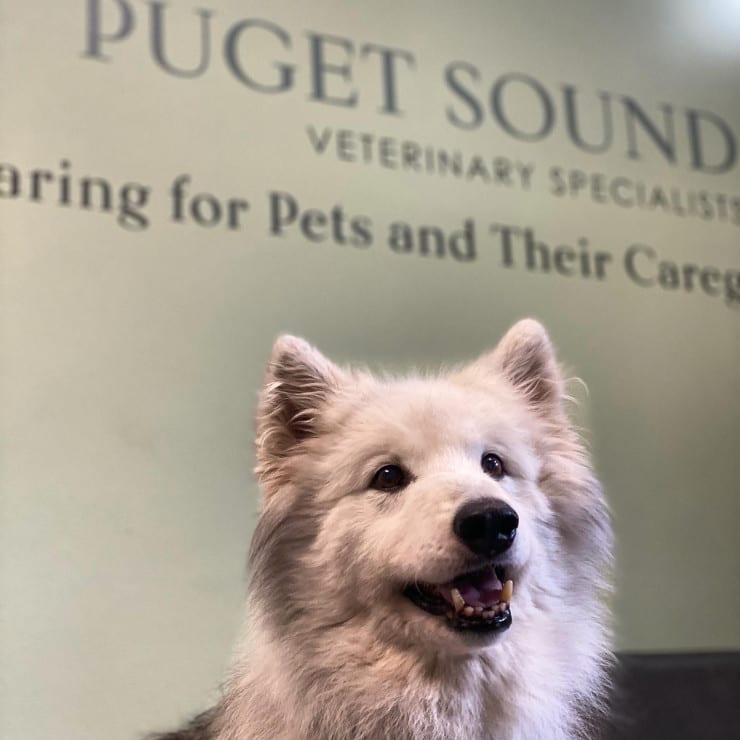
TRIPAWDS: You also have a veterinary nutritionist on board and that is also really unusual. Tell me a little bit about Dr. Streeter and what she does.
DR. RIZZO: Yes. So I met Dr. Streeter during my residency at Cornell. So I went to – I did my residency at a university that had nutrition there on your face all the time. They help critically ill patients in the ICU. They help people who want to cook for their dogs, which is getting more and more popular these days. She (Stephanie) can formulate unique and tailored recipes for pet parents whether they just want to cook because they want their dog to have the same fresh healthy food that they are eating or because they have a food allergy or because they want to address diabetes or cancer. She can help with that. She can give you the exact grams of proteins and broccoli and blueberries that you want to give that I just don’t have the education for.
And then the other thing that she can help the clients with and me is sometimes people come to me with a very long list of supplements that they want me to like look over and – which I do and I do some degree of research but this is her whole field. So I try to keep up. I know about the most common ones. But people are finding new stuff all the time.
She (Stephanie) can go through that list to help both of us decide, well, is this going to be harmful? Is it safe? Are there any studies? Just to sort of giving an idea, is this okay to use with this treatment? Is it going to be helpful? She can do a lot for us, which I really appreciate. She is a great one.
TRIPAWDS: That’s such a needed part of the cancer picture because one of the first things anybody wants to do, myself included, was, “Oh my God! How can I feed my dog or my cat better than I have been?” We tend to blame ourselves.
DR. RIZZO: Yeah, very common question.
What is the Best Part about Helping Pets with Cancer?
TRIPAWDS: I would love to hear more about why you chose to go into oncology and what do you enjoy most about it?
DR. RIZZO: I was – I went to a veterinary school thinking I was going to be a surgeon. But when – but I think it was the second semester we learned about lymphoma and I was hooked from the very minute. I was fascinated by cancer pathophysiology, the fact that it’s your own cells doing these horrible things to you. I was fascinated with lymphoma treatment itself, how you outsmart the cancer for as long as possible by mixing up the drugs.
And when it comes to the families, it’s one area of specialty medicine that we get to have this ongoing relationship with the family, which is the one thing I knew that I would miss from not being a general practitioner. So that part of it is really great. You really get to learn about their lives and their interaction with their pet and you get to be a part of that journey with them.
And yeah, of course it’s sad when we have to say goodbye and of course it’s sad and frustrating when treatment doesn’t work. I mean it’s terrible. But to be with the family in those really tough moments, it’s also really an honor. Not everybody gets to be there in those final moments. And I’m honored that they come back to me for that. That means a lot to me.
Learn from Watching Our Pets
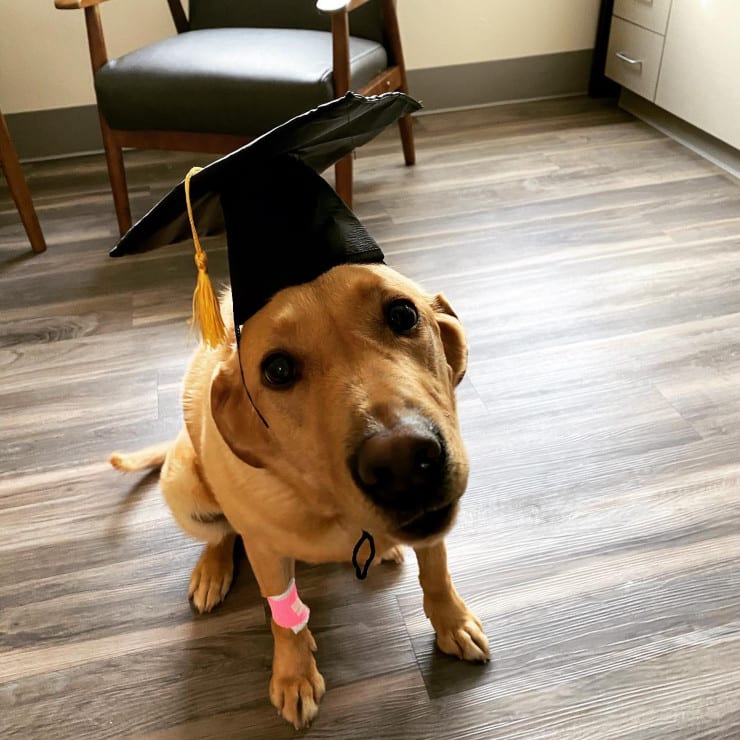
TRIPAWDS: When somebody does walk through those doors and they are scared and they are looking for some kind of help, what are some ideas that you give to people for coping with the diagnosis?
DR. RIZZO: A lot of people start scrutinizing everything that their dog does. They start watching them like a hawk and like every little thing that they do could be the beginning of the end and is this normal? And I feel like they are just like on hyper drive. I gently tell them to try to remember that they should probably try to focus on the sort of everyday little moments. Learn from their pet.
If we observe our pets and not – if we just take a moment to stop being on automatic pilot and observe the animals that we get to live with, we get a lesson every day in being in the moment, being in the here and now.
I don’t think so I don’t know for sure but I don’t think that they have goals the way we do. I don’t think that they are thinking about passing that exam or things like walking their daughter down the aisle or I don’t know, making a certain amount of money one day, like they are just enjoying every second.
And I tell people to act more like their pet and try to enjoy every moment with their pet. Not that you shouldn’t be observing what they are doing and their clinical signs, but to just relish those happy moments.
TRIPAWDS: That is awesome advice. And in our community, we like to call it learn how to Be More Dog or Be More Cat. And we even wrote a book called Be More Dog and it is about our journey with our dog, Jerry, and how before he got sick, we just – we were breezing through our work and life. And when he got sick, everything stopped and we started to watch him and all of a sudden, all the little ordinary things we realized, “Well, those are pretty special.”
So celebrate the little accomplishments and remember that your pets aren’t thinking about that six months anniversary or how much time do I have left?
DR. RIZZO: Or Christmas. I get a lot of that. “I just want him to see one more Christmas.” Yeah, I get that. But I don’t think he is thinking about that. He is happy to be with you.
TRIPAWDS: Absolutely. And I’m just curious, I know we didn’t talk about this, but what about cats? How do you – what do you think cats would tell us? Do they see – do you think they see the world differently than dogs? I’m just really curious.
DR. RIZZO: I mean they certainly act like they do, [Laughs]. I think they still live in the moment. I think that lesson is still there for sure. I think cats would be definitely more chill. They just seem more – but I did generalize. They are just more sophisticated. They are more chill. They really – they just don’t sweat the small things. Whereas, even though dogs live in the moment, my dogs, a butterfly will fly by the window and they are a cacophony of barking and everything is like a big deal. Cats are like, “Come on man, settle down.” I think cats are sort of always laughing at dogs.
TRIPAWDS: I would have to agree with that. We have a pretty neurotic German Shepherd and I can’t see any cat who would behave like he does.
DR. RIZZO: Right. Yeah. It just doesn’t happen.
What Everyone Needs to Know About Pet Cancer Care
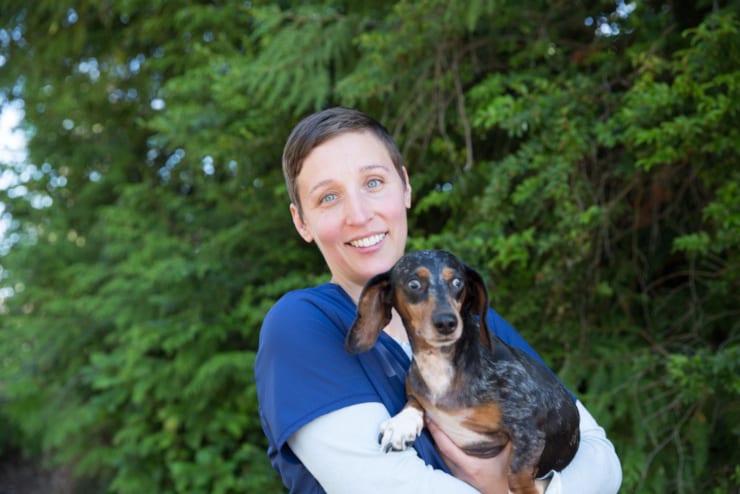
TRIPAWDS: If somebody is on the fence about oncology and they are trying to decide, should I do it, should I not it and whether they have a cat or a dog, what would you like them to know most about treatment and living with cancer?
DR. RIZZO: Well, my number one piece of advice is at least go talk to a veterinary oncologist, which conversation does not commit you to aggressive treatment or weekly treatment. There might be other options that maybe you couldn’t find on the internet or maybe your general practitioner doesn’t know about.
My number one piece of advice is to please just go talk to a veterinary oncologist. Please talk to a specialist.
And if I had to pick one other thing, it would be that veterinary oncology while it’s similar to human oncology, we have very – we have different goals. Of course, they care about quality of life in human oncology but as we just discussed, humans have goals that they are trying to achieve whereas in veterinary oncology, I am 90-99% focused on quality of life. Period. Of course, I want animals to live as long as possible and for their parents to spend as time with them as possible, but not at the cost of quality of life.
What I often tell people who are just so scared when they are talking to me, I’m like, “Look, if I all I did was make dogs sick all day, my job would suck. I don’t want to do that.” So we don’t. We really are trying to maintain a good quality of life they already have or improve it if they are sick.
TRIPAWDS: I love that. Thank you so much for sharing such wisdom with us and I want everybody to hear this because I was one of those people who was terrified of oncology when Jerry was diagnosed and had I talked to somebody like you, I don’t know. Things would have been very different I think.
DR. RIZZO: Thank you.
TRIPAWDS: So yeah, really, information is power and if you can a practitioner like Dr. Rizzo, oh my gosh, you are – you’re set. I wish we could like duplicate you all over the country because you’re awesome.
DR. RIZZO: [Laughs] Thank you.
TRIPAWDS: Many thank to Dr. Rizzo for another thoughtful discussion to help make the most of the pet cancer journey. Learn more about the work she is doing at PugetSoundVetSpecialists.com.
Find a certified fear-free vet team near at FearFreePets.com. Please subscribe and rate Tripawd Talk Radio on Apple Podcast and find all past episodes at Tripawds.com/radio. Subscribe to Tripawd Talk Radio for more pet amputation tips from experts and claim free gift just for listeners at Downloads.Tripawds.com/podcast.
[End of transcript]
All images courtesy of Dr. Rizzo & Puget Sound Veterinary Specialists.
